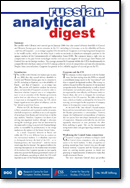Open Government Partnership in a Regime that Is Not Free?

Author(s): Irina Busygina, Mikhail Filippov
Editor(s): Stephen Aris, Matthias Neumann, Robert Orttung, Jeronim Perovic, Heiko Pleines, Hans-Henning Schröder, Aglaya Snetkov
Series: Russian Analytical Digest (RAD)
Issue: 123
Pages: 6-9
Publisher(s): Center for Security Studies (CSS), ETH Zurich; Research Centre for East European Studies, University of Bremen; Institute for European, Russian and Eurasian Studies, George Washington University
Publication Year: 2013
